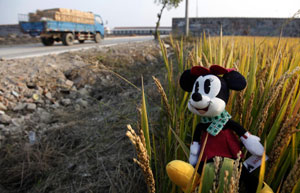Economy
China's CPI to rise 3.8% in Q4: Think tank
(Xinhua)
Updated: 2010-11-19 14:24
 |
Large Medium Small |
BEIJING - China's consumer price index (CPI), the main gauge of inflation, will rise 3.8 percent in the fourth quarter, the State Information Center (SIC) forecast Friday.
In a report in China Securities Journal, the SIC, a National Development and Reform Commission (NDRC) think tank, said the whole-year CPI is likely to slightly exceed the government's target of?three percent, but still "within tolerance of the society".
"The steep rise in the prices of edible oil, sugar and cotton are the major impetus behind the higher figure," the report said.
The report noted "imported inflation will exacerbate", as the weakening US dollar, a result of the second round of quantitative easing monetary policy of the Federal Reserve, will push up prices of major commodities like gold, non-ferrous metal and crude oil.
In addition, the government's measure to save energy and cut emission will also increase the price of water, natural gas and refined oil. Higher labor costs will also play a part in price rise, it said.
| |||||||
China's State Council on?Wednesday announced price control guidelines to reassure consumers facing rising inflation and urged local authorities to offer temporary subsidies to needy families.
To tame mounting inflation pressure, China's central bank raised benchmark interest rates last month and ordered banks to set aside more reserves Wednesday in its latest effort to rein in liquidity.
The SIC also urged authorities to shift its monetary policy from relatively easy to prudent while taking measures to rein in inflation.
 US companies still want to do business
US companies still want to do business

